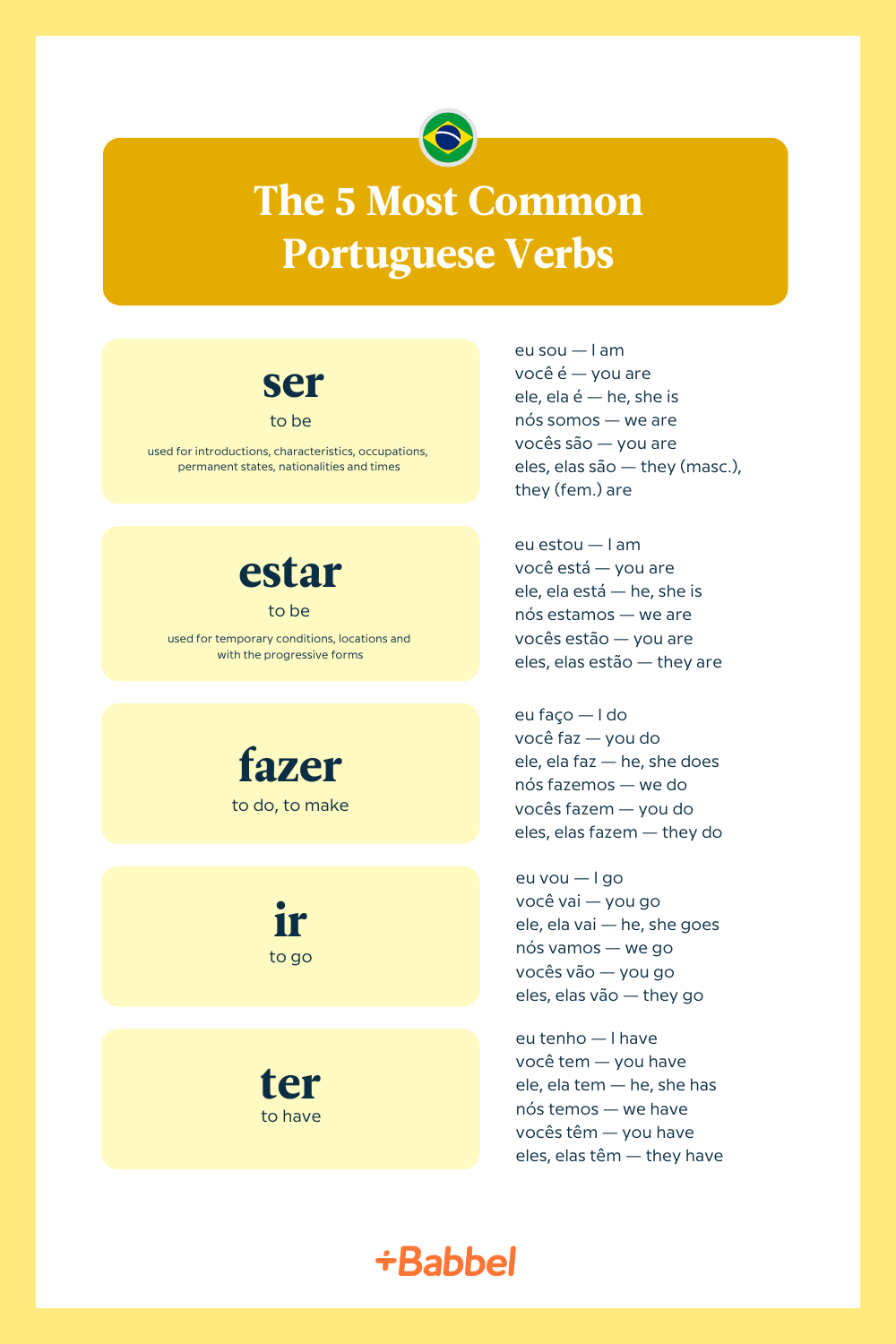How Many People Speak English, And Where Is It Spoken?
English is the most-spoken language in the world, and it can be found spread far and wide. While there’s no official lingua franca for the plane

So you want to learn Portuguese, but don’t know where to start? Don’t worry, that’s totally normal! The best way to not overload your brain is to focus on the most popular words first, like the most common Portuguese verbs. By starting with these words, you’ll be able to say a whole range of things, even if your vocabulary is small. And you can build up the rest later!

Ready? Let’s take a look at the 20 most common Portuguese verbs — along with their conjugations in the present tense and some practical examples.

| eu sou (“I am”) | nós somos — (“we are”) |
| você é (“you are”) | vocês são (“you (plural) are”) |
| ele, ela é (“he, she is”) | eles, elas são (“they (masc.), they (fem.) are”) |
Example: Nós somos a Ana e o Lucas. (“We are Ana and Lucas.”)
| eu estou | nós estamos |
| você está | vocês estão |
| ele, ela está | eles, elas estão |
Example: Eu estou muito cansado da viagem! (“I’m very tired from the trip!”)
Watch out! Both ser and estar mean “to be.” Ser is used for introductions and to name characteristics, occupations, permanent states, nationalities and times. Estar is used for temporary conditions, locations and with the progressive forms.
| eu tenho | nós temos |
| você tem | vocês têm |
| ele, ela tem | eles, elas têm |
Example: Você tem irmãos? (Do you have siblings?)
When ter is used by itself, it’s almost always in the impersonal form tem, which indicates the existence or availability of things. In this case, tem corresponds to “there is” in English.
Example: Neste restaurante tem muitas mesas livres. (“There are lots of free tables in this restaurant.”)
| eu faço | nós fazemos |
| você faz | vocês fazem |
| ele, ela faz | eles, elas fazem |
Example: Eu faço yoga três vezes por semana. (“I do yoga three times a week.”)
| eu vou | nós vamos |
| você vai | vocês vão |
| ele, ela vai | eles, elas vão |
Example: Hoje à noite eu vou ao cinema com a Gabriela. (“Tonight I’m going to the cinema with Gabriela.”)
| eu posso | nós podemos |
| você pode | vocês podem |
| ele, ela pode | eles, elas podem |
Example: Você pode vir à nossa festa na sexta-feira? (“Can you come to our party on Friday?”)
| eu sei | nós sabemos |
| você sabe | vocês sabem |
| ele, ela sabe | eles, elas sabem |
Example: Você sabe onde é o Teatro Nacional? (“Do you know where the National Theater is?”)
| eu coloco | nós colocamos |
| você coloca | vocês colocam |
| ele, ela coloca | eles, elas colocam |
Example: Onde eu coloco esse pacote? (Where do I put this package?)
| eu gosto | nós gostamos |
| você gosta | vocês gostam |
| ele, ela gosta | eles, elas gostam |
Example: Eu não gosto de cerveja quente! (“I don’t like warm beer!”)
| eu digo | nós dizemos |
| você diz | vocês dizem |
| ele, ela diz | eles, elas dizem |
Example: Eles sempre dizem o que pensam. (“They always say what they think.”)
| eu quero | nós queremos |
| você quer | vocês querem |
| ele, ela quer | eles, elas querem |
Example: Nós queremos viajar a Salvador em dezembro. (“We want to travel to Salvador in December.”)
| eu falo | nós falamos |
| você fala | vocês falam |
| ele, ela fala | eles, elas falam |
Example: Nós só falamos um pouquinho de inglês. (“We only speak a little English.”)
| eu dou | nós damos |
| você dá | vocês dão |
| ele, ela dá | eles, elas dão |
Example: Eu sempre dou 10% de gorjeta. (“I always give a 10% tip.”)
| eu vejo | nós vemos |
| você vê | vocês veem |
| ele, ela vê | eles, elas veem |
Example: Vocês veem televisão à noite? (“Do you watch TV at night?”)
| eu levo | nós levamos |
| você leva | vocês levam |
| ele, ela leva | eles, elas levam |
Example: Você leva as crianças para casa? (“Could you take the kids home?”)
| eu trago | nós trazemos |
| você traz | vocês trazem |
| ele, ela traz | eles, elas trazem |
Example: Eu trouxe um presente para você. (“I brought you a gift.”)
| eu acho | nós achamos |
| você acha | vocês acham |
| ele, ela acha | eles, elas acham |
Example: O que você acha dessa roupa? (“What do you think about this outfit?”)
| eu preciso | nós precisamos |
| você precisa | vocês precisam |
| ele, ela precisa | eles, elas precisam |
Example: Eu preciso da sua ajuda! (“I need your help!”)
| eu fico | nós ficamos |
| você fica | vocês ficam |
| ele, ela fica | eles, elas ficam |
Example: Você fica aqui? Eu já volto. (“Could you stay here? I’ll be right back.”)
Ficar is also used to indicate a fixed location, like buildings and addresses. In this case, it means “to be.” Meanwhile, when ficar is used with adjectives, it means “to become.”
Examples:
| eu venho | nós vimos |
| você vem | vocês vêm |
| ele, ela vem | eles, elas vêm |
Example: Quando você vem me visitar? (“When are you coming to visit me?”)
Now you know the 20 most common Portuguese verbs! All that’s left to do is commit them to memory and slowly start adding more words and phrases.

English is the most-spoken language in the world, and it can be found spread far and wide. While there’s no official lingua franca for the plane

You may have heard that the longest word in the world is antidisestablishmentarianism. This 28-letter word, which is the name of a movement in 19th ce

Profanity is experiencing a renaissance right now. A Profanaissance, if you will. There’s more swearing on television than ever before, and even cursi

The Carnival of Venice is an annual celebration in Italy — and one that’s world famous for its intricate Venetian masks. In the festival, these

Before we discuss multilingual countries, it’s worth establishing that we’re talking about most countries in the world. Many of us who gre

We generally only see one side of celebrities: the superficial smiles on the red carpet, or the interviews full of gushing praise about new film proje

It’s that time of year again to pay homage to our planetary home. Every April 22 is Earth Day, an international acknowledgment of the beauty and biodi

Did you know that there’s an Italian dialect that took root in a country about 5,500 miles away from Italy? It’s true! A dialect of Venetian called Ta
We are a comprehensive and trusted information platform dedicated to delivering high-quality content across a wide range of topics, including society, technology, business, health, culture, and entertainment.
From breaking news to in-depth reports, we adhere to the principles of accuracy and diverse perspectives, helping readers find clarity and reliability in today’s fast-paced information landscape.
Our goal is to be a dependable source of knowledge for every reader—making information not only accessible but truly trustworthy. Looking ahead, we will continue to enhance our content and services, connecting the world and delivering value.